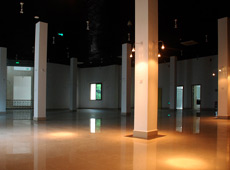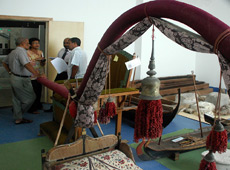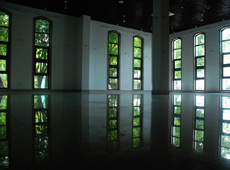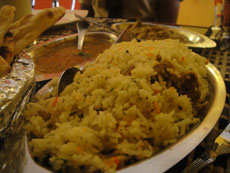The New National Museum will give Maldivians the opportunity “to examine and reinterpret our culture and whole way of life”, claims Ahmed Naseer, the state minister for Tourism, Arts and Culture.
“It’s a great museum complex that includes Male’s best garden park. We now have a lot of space for people to express themselves in various ways, and where people can take refuge from this hectic life in Male. A place where they can relax, experience a bit of entertainment, and improve their historical and cultural knowledge.”
Built by the Chinese government as part of a UNESCO project planned for almost 20 years, the new museum will officially open on Independence Day, Monday 26 July.
For the opening, the new building facing Chandanee Magu will show exhibits mainly from the old museum at the nearby Sultan’s Palace, while the other new building across the park will feature an exhibition of 120 faiykolhu or Maldivian legal deeds and other official documents dating from the 1600s to the 1930s, according to Aminath Shareef, who has been cataloguing the faiykolhu.
They have never been exhibited before, and were selected from 800 documents discovered by chance in Male in December 2008. “We’ve chosen a variety of documents for Maldivians to see at the opening,” says Shareef. “They are written in Dives Akuru, Tana, English and Urdu scripts.”
“The first Maldivian museum was established in the early 1950s,” says Ahmed Naseer. “Our collection has moved four times. At last it has found a permanent home. We will also try to acquire other private collections that people have in their homes. These people are waiting for a secure place to exhibit their precious possessions. We will be inviting them to display their collections, or lease items to the museum. We may even buy their collections once we have the legal framework in place. So it’s a very exciting future.
“We can finally address many issues that have lain dormant in our society. Historians use old books and other things to interpret history, but in our case there are very few books and the questions about where Maldivians came from and who we were before and after we converted to Islam – these questions have remained unexplored. Through the museum we can start examining and interpreting periods of our history, and this will give us a chance to find some answers.”
“Many Maldivians are aware of the fascinating work done on coral stone at the old Friday mosque. We are in the process of applying to UNESCO to have the mosque placed on the World Heritage list. In the Maldives, coral stone sculpture is a common factor throughout the atolls and some experts claim Maldivian coral stone work is the best in the world. Of course that is debatable, but through the museum we can examine these issues, and assess our heritage.
“There is a lot of interest among our young people and students. They are all looking forward to the opening. It’s something good that’s happening. We plan to integrate the museum with the education system. At the moment the heritage department is involved in setting up administration for training staff, but we will also be inviting lecturers to utilise the museum space.”

“Now the building has been finished, and the President and his cabinet decided we should open it on Independence Day,” explains Mamduh Waheed, deputy minister for Tourism, Arts and Culture, “we have to show our appreciation to the Chinese government and assure them that we will utilise the facilities they have so kindly provided.
“Within the ministry and the new heritage department we don’t have the capacity to handle the opening. Former members of the National Centre of Linguistics and History (which has now been disbanded) are helping, but even then we needed much more assistance, so the cabinet decided to put together a taskforce.”
Many Male organisations and government departments are taking part in the effort to have the museum ready for the official opening, according to taskforce co-ordinator Aminath Athifa, “Dhiraagu are working on the PA system, the Male’ Municipality and STELCO are helping, and the police are providing security as well as the MNDF who are also handling the physical transfers and exhibit arrangements. Every movement of our collection is photographed and documented.”
Regarding the museum’s long-term plans, Ahmed Naseer says, “We’ll be exploring non-academic methods of creating interest. In the future, there’ll be exhibitions to attract people who would not normally think a museum is a place for them. A lot of our old craft skills are dying away and they need to be revived. For example, the mat weaving that still occurs in Gaadhoo on Huvadhu atoll, and the lacquerware from Thulhaadhoo in Baa atoll. We will have exhibitions that include the craftspeople, and they can show others how mats and lacquerware are made. In Male we have a very fast pace of life and young people are often quite unaware of these skills. The people from the islands can show us how these beautiful things are created and it will inspire a resurgence in our craft skills and ability to earn more tourism income.”
The training of staff is the biggest challenge facing the museum’s administrators, Naseer explains. “We expect to receive assistance from other countries who are experienced in museum management, and hope to send our young people to neighbouring countries to get training in preservation methods.
“Invitations will be sent to foreign students to come and work as interns with local people; for example through the Heritage Centre in Singapore. We are planning to have exchange programs enabling our people to work overseas in other museums. This will help alleviate our staff shortages. A lot of people are looking forward to this; the level of expectation is high.

“From the beginning of the consultative process almost two decades ago, an important issue was the provision of a human resource program to train people to run the museum and maintain the collection. But the human resource requirements were not attended to; all the focus was on getting these huge buildings erected. It’s a pity that UNESCO didn’t insist on the training part of the project.
“Maldivians are very interested to learn about their heritage,” Naseer believes. “Most of it is not known. They will be able to question things for the first time. They were used to just obeying and accepting what they were told; not using their own minds. This is an opportunity for Maldivians to improve their knowledge of their past. They don’t have to be afraid to ask questions.
“A museum can be an exciting place that inspires people and we will develop the sort of trained staff the Maldivian people need to help them understand their heritage.”
Sultan’s Park and the Eden Project
An integral part of the new museum is the development of Sultan’s Park, situated between the two museum buildings, into a unique Maldivian botanical garden.
“Maldives is Eden’s latest project area,” says the organisation’s English curator, Ian Martin. “At the moment we are trying to renovate this very attractive garden and turn it into something with a big emphasis on the plants of the Maldives – how people think about them, how they use them. These plants can be used for fruit and vegetables, but there can also be plants for their spiritual satisfaction, appreciated for their beauty.
“Over the next year or so, we’ll really get involved with the transformation of a rather traditional ornamental garden into something very special for Maldivians. It will become a place where Maldivians can understand themselves and what their future could be – giving them ideas about how they can progress towards a more sustainable economy that isn’t just relying on fish and tourism.”

Ian Martin worked as a horticulturalist in tropical countries for 23 years before joining the Eden Project fourteen years ago. “My links abroad became useful to promote Eden’s philosophy of improving the understanding and care of plants for crops and conservation around the world,” he says.
“Helping in the initial landscaping work are labourers and other staff from the city’s nursery and the Male Municipality, and of course the MNDF personnel who have been really great and very easy men to work with.”
“The second phase of our work will be turning Sultan’s Park into a specialised garden – the only place in the world where you will find this particular collection of plants with these stories,” Martin explains. “We want to produce something distinct for the Maldives – something beyond being a nice garden with pleasant shade. Maldivians will find plants that have played a key role in their cultural identity. It will become a place for children to understand what it means to be a Maldivian. It can’t be boring, it has to be entertaining, and something they won’t be able to find anywhere else.”


